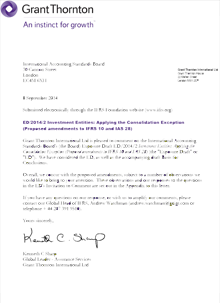-
Business consulting
Our business consulting services can help you improve your operational performance and productivity, adding value throughout your growth life cycle.
-
Business risk services
We can help you identify, understand and manage potential risks to safeguard your business and comply with regulatory requirements.
-
Forensic Advisory
At Grant Thornton, we have a wealth of knowledge in forensic services and can support you with issues such as dispute resolution, fraud and insurance claims.
-
Transactional advisory services
We can support you throughout the transaction process – helping achieve the best possible outcome at the point of the transaction and in the longer term.
-
Talent Management
Talent Management

-
Tax advisory and planning
Our teams have in-depth knowledge of the relationship between domestic and international tax laws.
-
Fiscal transactions advisory (Due Diligence)
Fiscal transactions advisory (Due Diligence)
-
Tax returns preparation and review
Tax returns preparation and review
-
Indirect tax recovery
The laws surrounding transfer pricing are becoming ever more complex as tax affairs of multinational companies are facing media, public and regulator scrutiny.
-
International tax
International tax
-
Expats services (Global Mobility)
Through our global organisation of member firms, we support both companies and individuals, providing insightful solutions to minimise tax burdens.
-
Bookkeeping & financial accounting
Effective bookkeeping and financial accounting are essential to the success of forward-thinking organisations.
-
Corporate advisory
We can help you navigate the complexity of the corporate secretarial requirements so you can focus your time and effort on running your business.
-
Payroll
Grant Thornton’s outsourcing teams can manage your payroll commitments on your behalf, allowing you to focus on what you do best – growing your business.
-
Company start-up
Outsourcing your operations and specific business functions to Grant Thornton can not only cut costs, but also bring you new insights and experience.
The IASB has begun its Post-implementation Review of IFRS 3 ‘Business Combinations’ by publishing a Request for Information on experience with, and the effect of, implementing the Standard.
The Request for Information marks the second of two phases to the Post-implementation Review. Having undertaken targeted outreach in the first phase of the project in order to identify areas that were perceived as problematic, the IASB is now formally seeking feedback on whether:
- IFRS 3 provides information that is useful to users of financial statements
- there are areas of the Standard that represent implementation challenges
- unexpected costs have arisen when preparing, auditing or enforcing the requirements of the Standard.
Particular topics of interest raised in the Request for Information include:
- are there benefits of having separate accounting treatments for business combinations and asset acquisitions?
- what are the most significant valuation challenges resulting from the Standard’s requirements on measuring fair values?
- is it useful to recognise intangible assets separately from goodwill?
- how useful is the information obtained from annually assessing goodwill and intangible assets with indefinite useful lives for impairment?
Depending on the nature of the findings from its review, the IASB may decide to:
- retain IFRS 3 as issued
- continue to monitor the implementation of IFRS 3 (if the results are inconclusive)
- revise IFRS 3 to remedy problems identified by the Post-implementation Review. Such a revision could take the form of an annual improvement or narrow-scope amendment. Alternatively it might take the form of a proposal for a standards-level project to assess the accounting or disclosure requirements.
While we raise some comments on areas where we believe the Standard could be improved, from an overall point of view we believe IFRS 3 provides an appropriate and coherent framework for accounting for business combinations. We have not identified any fundamental flaws in the Standard's requirements and see no need for a major overhaul.

